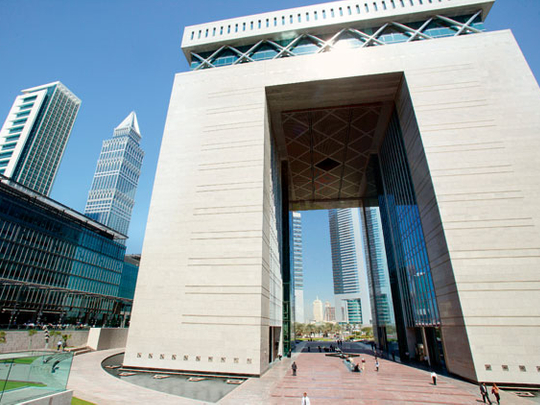
Dubai: Dubai International Financial Centre's sub-economy contributed about 3.6 per cent to the gross domestic product of Dubai while accounting for one per cent of the UAE's GDP.
The DIFC's GDP grew 5.2 per cent in 2010 compared to 2.77 per cent in 2009. The latest DIFC Economic Activity Survey places the total GDP of the centre's sub-economy at $2.92 billion.
This puts DIFC's contribution to Dubai's GDP at 3.6 per cent of $81.96 billion and its contribution to the UAE economy at 0.97 per cent.
The economic survey, undertaken by the DIFC Economics Department, is based on international best practices in national accounting, and measures output, intermediate consumption and ultimately the gross value added produced within the DIFC district by entities registered in the centre.
DIFC received 477 respondents to the survey which represents nearly 62 per cent of its client base.
"The survey results indicate that there was a strong recovery in economic activities in the DIFC last year compared to 2009. We have witnessed the continuation of this in the first half of 2011," said Dr Nasser Saidi, Chief Economist and Head of External Relations of DIFC.
Strong links
Saidi said the number of "active entities in DIFC rose 9.5 per cent in 2010 compared to 2009 to 773. The financial sector accounted for 72 per cent of the total output of the DIFC with business services and public administration contributing 26.5 per cent and 1.5 per cent respectively.
DIFC officials said companies based in the financial centre are benefiting from strong business links to the fast growing emerging markets in Asia, Africa and Central Asia.
"Today's report highlights the significant role the DIFC plays within Dubai and the UAE which we are very proud of. However, DIFC is not just a cornerstone of the Dubai and UAE economies, but it is also a conduit for attracting investment and supporting the growth of economies across the entire region," said Abdullah Mohammad Al Awar, CEO of the DIFC Authority.
Officials said with the growing role and confidence in Dubai as a safe haven, the emirate has confirmed its position as the financial, logistic, tourism and business hub of the Middle East, with the DIFC as the central component of the banking and financial sector.
"The bulk of the companies in the DIFC have come from emerging markets such as India, China and South Korea, and our strategy is very much to focus on emerging markets," Saidi said.
"The safe haven effect is important for the UAE and Qatar that will mean that the results of 2011 will be substantially better."
This year's data also included the results of a detailed labour force survey, to track not only employment growth in the DIFC but also the quality, distribution and average pay for the diverse workforce.
In 2010, the DIFC had about 11,331 fulltime employees, of which men represented 65.5 per cent (7,427), with a diverse and highly skilled workforce of whom 86 per cent were university graduates and post-graduates.
The percentage of UAE nationals working in the DIFC was 2.2 per cent.
- 1%: contribution to UAE's GDP in 2010
- 72%: financial sector's contribution to output
- 26.5%: business services sector's contribution to output
Plans for tier 2 market approved
The Dubai International Financial Centre's plans to set up a new tier 2 stock market for small and medium enterprises have got official commitment from the UAE federal government and from the Dubai government, Dr Nasser Saidi, DIFC chief economist, said on Monday.
The DIFC has been working on a plan to set up a tier 2 equity market to accommodate small and medium enterprises run by families and hundreds of well-run free zone entities operating within the UAE and across the region.
The new market, when established, will function as an alternate market similar to the AIM (The Alternate Investment Market) in London that allows smaller companies to float their shares by lowering the regulatory threshold in comparison to a main market.
"We have been talking to a lot of companies and financial institutions on the project. All are very enthusiastic about the potential of such a market.
"We will be making an announcement on the initiative within next few months," said Saidi.
The new initiative for a tier 2 market comes at a time when there have been calls to merge the country's two domestic stock exchanges, Abu Dhabi Stock Market and Dubai Financial Market.











